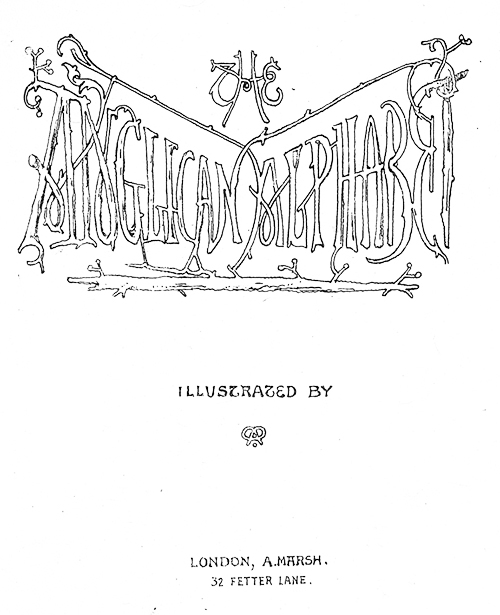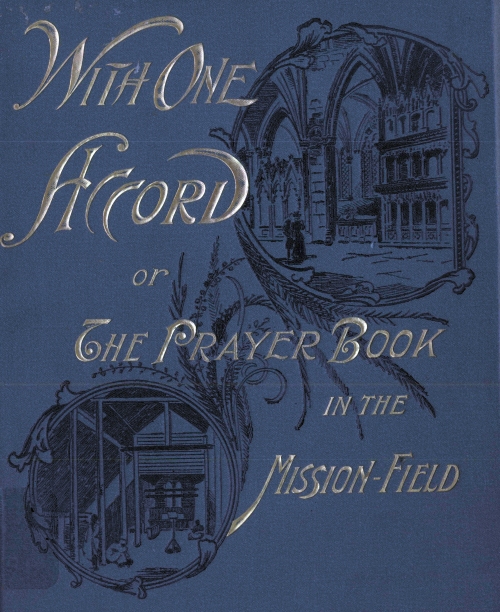IT is related of an English bishop that in reply to a request for permission to use certain forms from the Roman offices he said: “The English Book gives you a very good Mass; you will have to mumble that.” Like jokes made in a court of justice, one must reconstruct mentally the episcopal attitude in England to appreciate the wit. Leaving on one side the vexed question of interpolations, we shall find plenty of thorny roads to travel if we confine our investigations to “mumbling.”
It opens up the whole question crystallized by the Latin formula, “ex opere operato.” If the action outweighs the words, then the utterance of the words becomes a matter of secondary importance carried to an extreme we have it in the inaudible Low Mass often said by priests of the Latin obedience and. Unhappily, by some of our own. Undoubtedly in primitive times the “loud voice” was widely used in portions of the Liturgy which in the modern Roman rite was said almost inaudibly. Then Latin was a living tongue. The same phenomenon in the use of the Anglican rite should give us pause before we lay the burden of mumbling upon the use of a dead language. For, after making all due allowance for “senseless imitation” of Roman practices, the same reasons which operated to produce the Roman practice may still be in force and active. For the habit of mumbling arose while Latin was still the spoken language of all educated people. Mass was mumbled in Hungary while the debates in Parliament were carried on in Latin, even till the reign of Maria Theresa.
For it must be remembered that mumbling is almost wholly confined to the celebration of the Eucharist. The offices are usually recited at least in audible tones. They may be said too rapidly, but they are scarcely ever mumbled, if there is a congregation present. For Matins and Evensong all present have their books. If a tired priest must spare his voice he may well do so in those portions taken from the printed Prayer Book. But for the lessons the whole congregation is dependent upon the reader. Inarticulate reading is indefensible; even if the reader is morally certain that the lesson is incomprehensible to the people, he has no right to arouse in them the feeling that they may have missed something. Distinctness of articulation is much more important than volume of sound. It is moreover a mark both of good breeding and of good education to speak one’s own language intelligibly. Merely as literature the English Bible in any of its versions is magnificent prose and worthy of the most exact public reading. Yet, in avoiding the Scylla of inaudible or unintelligent reading, equally there must not be a falling into the Charybdis of a dramatic reading. As much offense may rightly be taken at a patronizing attitude, as towards a too mystic attitude. Nothing is so irritating as the pomposity which mouths the sacred scriptures in a way suggesting that the reader knows their inmost meaning. Yet a clear articulation may still leave the sense of awe which fell upon the writer as he set down thoughts too deep for words, and gave utterance to visions whose majesty transcends the utmost heights of human speech. Unless the reader feels the mystery of his subject, not only will he fail to convey the true impression of the revelation of God’s ways with men, but he will convey inevitably to his hearers an impression of his own impertinence.
And just a passing hint may be sufficient to remind the officiating minister that if, for any reason, he must spare his voice he should at least endeavor to mark the words at which the people take up their response. A very little emphasis is quite enough to gain this object.
But mumbling is rarely charged against a minister at other public offices, such as Baptism, or Holy Matrimony, or at Confirmation. No one expects the charge to both the parties at a marriage to be read as if it were a menace to the whole congregation. The more private portions may be read more privately. The mumbling much complained of is the mumbling of the service of the altar. Some complaints, no doubt, are made unreasonably. Human nature being what it is, no Church can reasonably hope to escape from chronic grumblers. One complaint was lodged , against a priest by a good lady that she had not heard a single word that morning. It was absolutely true; but over night a sudden cold had robbed the priest of his voice. It is only fair to add that the lady in question was not a chronic grumbler, and the priest was usually of a clear and powerful voice. Yet at a daily Eucharist no injury has been done to anyone who wilfully takes a seat beyond the ordinary range of one man’s voice. Seats are provided nearer to the celebrant, and only thoughtlessness would ask of him a greater measure of exertion required to make him audible in distant portions of the church.
Still there remains the practice which arouses resentment, the deliberate mumbling of the service. We are speaking of a well considered and deliberate act;’ we are not now speaking of defects of voice production due to carelessness, or to imperfect knowledge of the carrying power of his own voice upon the priest’s part.
There are those who defend the practice. The offering of the sacrifice, we are reminded, is of so great a mystery that the words are quite unequal to the action. Moreover there is behind this reason a revulsion from the Puritan endeavor to exalt the plain Gospel preaching over the ancient Sacramental system. Some omissions from our Prayer Book, it is urged, were incidental rather than intentional. Cranmer’s inability to master English verse deprived us of the ancient office hymns; there was no other reason. Nor can it ever be forgotten that the English Book was tentative, experimental. No one could foresee its permanency. Temporary “Offertories” and “Communions” were provided, but not disposed as formerly to every festival and Sunday; only the Offertory Sentences survived. Graduals, tracts, and alleluias were left over for another time, which has not come as yet officially. So were other things omitted for the lack of a translator, or in the press and hurry of the composition. Some of the omissions, no doubt, are unfortunate, some are used at times in the form of private devotions. Only that is said aloud which is printed in the Standard Book of Common Prayer. Of any secreta there is no usual complaint.
But after all is said, Anglican public worship is cast throughout in the form of common prayer. Our people do not go to “hear Mass;” they go—and they ought to go—to participate in the service as intelligent, worshipping people. Their private devotions supplement the act and the words of the priest; they do not supplant these.
Meditation is good, and Anglicans generally are deficient in its practice. Yet experience teaches that that practice is not promoted by the inaudible mumbling of the priest. The people are not taught how to make the most of such silences as now exist in every church. Go to any early service on a Sunday morning. The church is almost empty till within five minutes of the appointed hour. The first words of the celebrant are well-nigh a positive relief to many restless souls who scarcely know which is the more distracting, the entry of later comers than themselves, or the silence even of the organ. During the Offertory there is once more an uneasiness which may be felt. And at the Communion of the people the silence is one of painful self-restraint, covered in some places by the singing of a hymn. The ablutions take a dreadful time, for the people seldom know the way to make thanksgiving for their own Communion. Were a printed form supplied, most gladly would they join together in the recitation of an office of thanksgiving, if a reader were provided. Vocal prayer they understand.
No doubt this uneasiness is a defect in the Anglican Churchman, in which most of us share. Perhaps we find it at its worst among our nervous Americans. But if we cannot use profitably the silences and pauses that are incidental to the service, how shall it be supposed that we shall profit by the inaudibility of those parts of the service which the priest says for us to God and for God to us?
Mumbling, then, does not, in fact, produce the spirit of meditation among the people nor develop in them the art of private devotion. If there be any of our reverend fathers who modulate their voices in order to promote these laudable practices, their efforts are pathetic failures.
All of us who attend the offering of the divine liturgy, laymen though we be, desire to participate intelligently in the service.
The Living Church, June 24, 1916, pp. 272-273.

 The Anglican Alphabet
The Anglican Alphabet